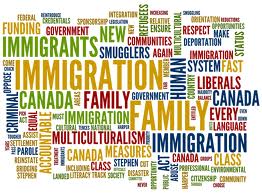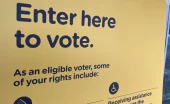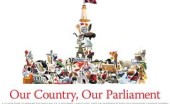Re Ian Bremmer 'Could third-party candidates upend the 2024 US election?' 3 April The current political movement in the USA…
Canada: Immigration
Written by Diana Thebaud Nicholson // April 28, 2014 // Canada, Immigration/migration // Comments Off on Canada: Immigration
Employment Minister Jason Kenney’s reputation under attack over temporary foreign workers
In the midst of a fresh eruption of abuse allegations surrounding the government’s troubled temporary foreign worker program, is Jason Kenney’s reputation as a capable taskmaster taking a beating?
The employment minister was on the defensive Monday in the House of Commons, but he’s also under attack from business groups, labour unions and — perhaps most troubling for Kenney with a federal election looming — everyday Canadians who believe the Conservatives have made it easier for foreigners to swipe their jobs.
24 April
Terence Corcoran: How Canada’s temporary foreign workers program became a victim of its own success
Few issues can fan populist fires more quickly than immigration policy, especially if a policy seems to promote the arrival in Canada of low-paid workers who are taking jobs from Canadians. So it is no surprise that we are witnessing the bonfire of the Temporary Foreign Worker Program, a 10-year-old federal scheme designed to allow companies to bring in workers to work in sectors and industries facing chronic labour shortages. …
In high abstract economics, free trade is a good thing, and free movement of people would be even better. The world may be moving toward greater cross-border migration, temporary and permanent, but it is by no means a policy any government can openly adopt.
And now comes a heavy-duty economic analysis from the C.D. Howe Institute claiming that the TFWP caused increased unemployment in Alberta and British Columbia. The paper could put a serious crimp in the federal government’s program that has proven wildly successful. As of December, an estimated 338,000 temporary foreign workers held jobs in Canada.
23 April
Temporary foreign worker program may be beyond fixing: Tim Harper
If Ottawa can’t properly police Canada’s temporary foreign workers program, it should be scrapped.
(Troonto Star) The Conservatives didn’t invent the temporary foreign worker program but they are now wearing it.
Under their watch the program has mushroomed and so have the abuses. They have proved woefully unable to police the program.
The program has also exposed the darkest instincts of too many small Canadian businesses, the same businesses this government claims to champion.
They have shown no hesitation in uprooting Canadian workers and replacing them with temporary foreign workers, finding the latter more compliant and less likely to push for those highly inconvenient things like better hours, better pay and days off.
The Conservatives have now done what seems to be the impossible — cutting hours for Canadian workers, setting the stage for the ill-treatment of temporary workers, further alienating the labour movement in this country and fielding complaints from small businesses who play by the rules who say those rules are too onerous.
6 February
Ten ways Ottawa is changing how to become a Canadian citizen
The federal government has tabled changes to Canada’s citizenship law, billed as the first overhaul in a generation.
The rules make it tougher to get citizenship but also pledge to tackle the backlog of applications. Here are some of the major changes.
26 January
Chris Alexander shows his callous side: Carol Goar
Chris Alexander’s transformation from impressive global diplomat to slogan-spouting immigration minister.
(Toronto Star) The Tories obviously believe they can win more votes by denigrating asylum seekers than by offering health care to sick people awaiting a refugee determination hearing. No doubt they have polls backing up their strategy.
Refugee advocates know that. They watched Alexander’s predecessor, Jason Kenney, systematically convince Canadians — even those who took pride in their country’s reputation for openness — that they were being duped, used and ridiculed abroad.
He changed the vocabulary used by immigration officials. Phrases such as bogus refugee claimants, gold-plated benefits, queue jumpers and fraudsters came to the fore. Public attitudes hardened.
 The Centre for Immigration Policy Reform/Centre pour une Réforme des Politiques d’Immigration (CIPR/CRPI)
The Centre for Immigration Policy Reform/Centre pour une Réforme des Politiques d’Immigration (CIPR/CRPI)
Economic Justice– Immigration: Minister Kenney once again takes umbrage, this time with David Suzuki
2013
15 July
Stephen Harper names eight new members to his cabinet
Jason Kenney was named the first minister of employment and social development (a newly-named Human Resources and Skills Development Canada), while Chris Alexander, long considered due for a big promotion, has moved into the immigration file.
Jason Kenney’s 10 Biggest Blunders as Immigration Minister
(HuffPost blog) This spring, Alberta MP Jason Kenney became the longest continually serving Immigration Minister in Canadian history, according to his department. With the Cabinet Shuffle, his tenure ends. What better time to review the Immigration Minister’s biggest blunders on this ever important file? Perhaps serve as a cautionary tale to the new Minister. …the reality is that the gate the Conservatives have built is more like a sieve which porosity depends more on preconceived perceptions than proven potential of immigrant success.
13 July
Jason Kenney indulges in irrational rant about David Suzuki’s “xenophobia”
(Ottawa Citizen blog) For decades Canadians have been instructed about the ostensible benefits of mass immigration. They’ve been told huge numbers of immigrants are needed to keep the economy ticking and provide the tax base to pay for all those social programs we enjoy. In recent years, however, this justification for current immigration policies has been questioned by respectable scholars.
… With his irrational denunciation of Suzuki, Kenney demonstrates that those who benefit most from current immigration levels — … are quite willing to throw out ad hominem epithets of racist, bigotry and, in Suzuki’s case, xenophobe — to intimidate those reluctant to accept the fairytale view of immigration.
11 July
Jason Kenney: David Suzuki’s Immigration Views ‘Toxic And Irresponsible’
Federal Immigration Minister Jason Kenney has slammed environmental icon David Suzuki for espousing “toxic and irresponsible” views about immigration.
Suzuki took aim at the Harper government in an article published last Monday by the Parisian newspaper L’Express, in which he accuses Prime Minister Stephen Harper of doing little to combat global warming.
Reporter Jean-Michel Demetz asked Suzuki what he thought about Australian environmentalists who oppose immigration because they do not believe natural resources can withstand population growth.
“Oh, I think Canada is full too! Although it’s the second largest country in the world, our useful area has been reduced,” Suzuki said. “Our immigration policy is disgusting: We plunder southern countries by depriving them of future leaders, and we want to increase our population to support economic growth. It’s crazy!”
10 May
Don’t bring parents here for welfare, Kenney says
Immigration minister cites ‘abuse of Canada’s generosity’ as changes to family reunification program announced
Citizenship and Immigration Minister Jason Kenney announced new criteria for sponsoring parents and grandparents to come to Canada today that are aimed at ensuring elderly immigrants don’t end up on welfare or in social housing.
The changes are part of “phase 2” of the government’s overhaul of the family reunification category of immigration. New applications for the program have been on hold since 2011 in order to cut down on a massive backlog that resulted in wait times of eight years.
Kenney said applications will resume Jan. 1, 2014, and will be limited to 5,000 per year. The applications will still take years to process because of the ongoing backlog. By the end of the year, the backlog is estimated to be around 80,000 applications.
21 March
Immigration Reforms in Canada’s Economic Action Plan 2013
Canada’s Economic Action Plan 2013 announced this afternoon outlines the Government’s intention to enhance Canada’s immigration system with a focus on fuelling economic growth and job creation. The Action Plan confirms the Government’s intention to improve the foreign credential recognition process and create a new “Expression of Interest” immigration management system which will allow for Canadian employers, provinces and territories to select skilled immigrants from a pool of applicants who best meet Canada’s economic needs. In the coming year, the Government will also reform the Federal Skilled Worker Program, test new approaches to attracting immigrant investors through a new Start-Up Visa and strengthen Canada’s position as a country of choice to study and conduct research. » More
13 March
Terence Corcoran: Unwelcome to Canada: We’re setting immigration records, but it’s nothing to trumpet
To hear Immigration Minister Jason Kenney tell it, Canada is in the midst of an immigration boom. He reported to Parliament last year that 2013 will mark the seventh consecutive year in which Canada will admit between 240,000 and 260,000 new permanent residents. “This is the highest sustained level of immigration in Canadian history.”
It’s hard to know why Kenney would trumpet a claim that is at best misleading and at worst just not true. My suspicion is that as a cabinet minister in a Conservative government that contains factions that are doubtful about the value of immigration, he needs to tread carefully. The declaration that Canada is setting immigration records obscures the policy reality. The federal government is, in fact, keeping a lid on new arrivals, much to the detriment of the country and the economy.
2012
14 September
Maple leaf ragged: what ails Canada?
Country’s increasingly hardline stances on immigration, tar sands, indigenous people and Quebec separatism spark soul-searching
(The Guardian) Canada is one of the few countries in the world that still looks to immigration as a tool for nation-building – 20% of Canadians were born abroad, and new immigrants add 0.8% to the country’s population each year. Multiculturalism has been a formal policy since 1971; it’s taught in the country’s elementary schools.Yet over the past year immigration authorities have radically adjusted the criteria for successful applications and cut resettlement programmes en masse. In June, Ottawa provoked a firestorm of controversy – and sparked a spate of doctors’ protests – when it eliminated all but the most basic healthcare for certain refugee groups. Last week, immigration minister Jason Kenney announced that 3,100 people would have their Canadian citizenship revoked for hiring immigration consultants to falsify their documents. Eleven thousand aspiring citizens are still under investigation.”There’s a lot that we need to fix pronto, otherwise the message goes out to the world that we’re not a welcoming place,” said Ratna Omidvar, president of Toronto-based immigration foundation Maytree.
Since 2006, the refusal rate for Canadian citizenship applications has doubled; the number of immigrants from Asian countries such as China and India has halved.
Some analysts say the changes point to a deep-rooted, yet widely ignored undercurrent of racism in Canadian society. In late August, news leaked that the Bank of Canada had removed an east Asian-looking woman from preliminary designs of its new $100 bill, replacing her with a caucasian. Chinese groups were outraged, causing the bank to issue a public apology.
“Fighting racism in the States is like punching a brick wall, but fighting it in Canada is like punching a marshmallow – it always melds back to the same shape,” said Minelle Mahtani, a professor at University of Toronto Scarborough. “We live in an ostrich-head-in-the-sand-like denial that racism exists in this country, and yet systemic discrimination is the norm.”
18 July
Tory Move ‘Makes Foreign Workers An Employer’s First Choice’
“Under this program, employers don’t have to show that they’ve made any attempts to fill these jobs with Canadians first,” said Nancy Furlong, with the Alberta Federation of Labour.
“Kenney’s latest move makes the Temporary Foreign Workers program an employer’s first choice, not last resort,” she said.
Federal Immigration Minister Jason Kenney announced Monday a one-year pilot project that will reduce the paperwork needed to hire skilled workers under the Temporary Foreign Workers Program.
Instead of waiting months to get to work, it will now take only 30 minutes, said Kenney
“They can immediately begin recruiting in visa exempt countries like the US, invite those folks to come up and as long as they make an application for their certification to get their ticket to work as a trades person they’ll get a work permit at the airport,” he said.
The province is short welders, heavy-duty mechanics, ironworkers, millwrights, carpenter and estimators.
14 May
Getting PhD Immigrants Out of Cabs and into Their Field
The upcoming federal budget is expected to include major immigration reforms. The reforms are aimed at refining and expediting the immigration selection process. The ultimate goal is to increase the odds of success for new arrivals by matching Canada’s needs with potential immigrants.
Canada is in a global competition for talent and skills. We need qualified immigrants to enhance our labour force and expand our tax base. Most of the medium- to long-term challenges our country is grappling with can be addressed to a considerable extent with immigration: Skilled labour shortage, aging population, and fiscal pressure on shrinking government revenues can be mitigated to a large degree with smart immigration policies. …
The biggest challenge immigrants face today is finding employment that utilizes their skill. Mentorship programs have proven incredibly valuable in helping immigrants find permanent employment within their field of expertise. The government needs to expand existing mentorship programs. This initiative will help immigrants attain their first “Canadian experience” job, removing the biggest obstacle many face.
The government can take a leadership role by identifying mentorship opportunities within the federal bureaucracy, the largest employer in Canada. The government also needs to strike partnerships with professional associations and regulators to create a transparent roadmap for each profession in each province making it clear to immigrants early on what steps they are expected to follow if they want to convert their foreign credentials.
20 April
Businesses To Choose From Pool Of Immigrants Under New Tory Plan
If Immigration Minister Jason Kenney has his way, employers will soon play a much more active role in selecting newcomers, and those chosen will be put on a fast-track to admission to Canada.
But Kenney disputes the notion that the reforms will cede too much control to private interests.
“The reforms are not about completely handing over to employers the power of selection, but rather about increasing their role,” he told The Huffington Post Canada this week. “There will continue to be a certain criteria that people have to meet.”
In an editorial board meeting with HuffPost, Kenney detailed the Conservative government’s plan to better align Canada’s immigration system with labour market needs, and address a skills mismatch that he says has led to “a huge waste of human talent.”
“I think it’s almost immoral to invite people from the highest socioeconomic status in their countries of origin to come here to Canada and face an uncertain future […] to get stuck in perpetual unemployment,” he said. “This makes no sense in a country with a skilled labour shortage.”
His solution: develop an Internet-based system that allows employers facing a labour crunch to select immigrants from a pool of qualified would-be Canadians. [How does this solve the problem of accreditation of professionals, doctors, engineers, architects, by their respective professional associations?]
2 February
Tories’ Immigration Incoherence
If there’s a consistent thread of logic or principle running through the federal Tories’ approach to immigration, I’ve yet to see it. Six years in, despite much bloviating over the brilliance of Harper’s supposedly visionary Immigration Minister Jason Kenney, official Conservative pronouncements on the matter still show no sign of coalescing behind anything remotely resembling a coherent theme or agenda.
On the one hand, there’s certainly been no shortage of unsubtle pandering to the right. From ostentatiously religious, gay marriage-denying citizenship brochures and ominous campaign ads featuring scary ships packed with foreigners, to proposals for easier-to-fail citizenship tests and tougher English standards for new residents, the open-borders crowd has rarely been bereft of press releases to wring its hands over.
Yet at the same time, almost every step rightward has been met by a furious Kenney damage-control tour — usually in local immigrant media — in which the minister confidently assures his critics that no, actually, things are more the same than ever.
Take the federal government’s recent decree, issued earlier this month, that Canada would be imposing an immediate moratorium on immigration applications from the elderly relatives of existing residents. Out of context, this sounds conservative enough. Supporting a decrease in legal immigration, particularly of the non-economic sort, is actually a more mainstream position than is often acknowledged in this country — particularly among the Tory base.
But speaking to the Asian Pacific Post last week, Kenney himself assured the paper that lower numbers were really the furthest thing from his mind.
2011
30 December
Canada Immigration Reform: Jason Kenney Seeks Young, Educated, Skilled And Fluent Newcomers
(Canadian Press) Immigration Minister Jason Kenney has never suffered from lack of ambition and his latest goal is nothing short of reshaping and rejuvenating the Canadian workforce.
He envisions a nimble, efficient immigration machine that will help solve Canada’s demographic imbalance and boost the country’s competitiveness simultaneously.
Step one comes this week when he announces immigration targets for next year.
Kenney says when he is done with his multiple reforms of the system, the flow of newcomers into Canada will be predominantly young, well educated, highly skilled, and fluent in English or French.
They’ll be admitted to Canada within a year of applying.
And soon after, they’ll start paying taxes because they will have lined up a job prior to arrival or should be able to find one quickly once they land.



